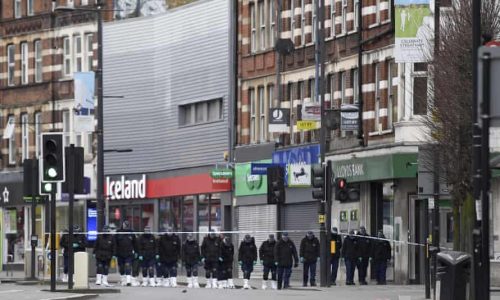
UK authoritiees freed 42 terrorists in year before law to detain extremists for longer
More than 40 convicted terrorists were released from prison in the year before emergency legislation was introduced to keep jailed extremists locked up for longer, figures reveal, while the number of far-right detainees has surged.
After a non-fatal terror attack in south-west London last month, the government fast-tracked laws to prevent the automatic release of terrorist offenders without Parole Board assessment. The new laws, which came into force a week ago, were applied retrospectively, meaning serving prisoners will stay in prison longer than expected.
But according to the latest figures on use of the Terrorism Act, in the year to September 2019, 42 convicted terrorists were released from custody after serving prison sentences, some of whom would have been released automatically at the halfway point of their sentence with no Parole Board assessment.
Meanwhile, the figures reveal that the number of prisoners classed as rightwing extremists who are behind bars for terrorism offences has almost doubled in two years.
In the year to the end of December, there were 41 people in custody categorised as holding extreme rightwing ideology, up from just a handful of cases five years ago –four in 2014 – to 21 for the same period in 2017 and 28 in 2018.
Last month, a proscription order was issued, making membership of the neo-nazi group Sonnenkrieg Division illegal in the UK. It also recognised System Resistance Network as an alias of the already banned neo-Nazi group National Action. Anyone found to be a member of, or offering support to, the groups could now face up to 10 years in jail.
Overall, as of 31 December, there were 231 people in custody for terrorism-related offences, the “vast majority”, or 77%, branded as holding Islamist-extremist views.
The convicted terrorist Sudesh Amman, who was shot dead by plain-clothes officers after he stabbed two people on 2 February, was released about 10 days before he launched the assault on a busy Streatham High Road. He had been released automatically at the midway point of his sentence despite authorities having serious concerns about the risk he posed to the public.
Under the emergency laws, all terrorist offenders will now have to serve two thirds of their sentence before being eligible for a Parole Board assessment and will not be automatically released.
The proposals were in addition to a broad package of counter-terrorism measures announced by the Home Office and the Ministry of Justice, which included plans to introduce lie-detector tests for terrorist offenders as well as the recruitment of specialist counter-terrorism probation officers.
The number of arrests for terrorism-related activity has dropped to the lowest number in six years – 280 to 31 December – but rose in the last quarter and remains higher than the annual average of 260.
Of these, 110 (39%) people were released on bail or released under investigation – meaning they were not subjected to any restrictions while inquiries into the offences continued. There were 87 (31%) charged and 65 of these were for terrorism-related offences. A further 19 (7%) received a caution, were recalled to prison or handed over to immigration authorities and 63 suspects or 23% were released without charge.
Commonly, sentences are consistently less than four years and were handed down for more than half of the convictions, 24 out of 46. Three offenders in the last year were handed a life sentence, down from six in the previous year, but the number of long-term sentences of more than 10 years rose slightly.
Source: The Guardian





